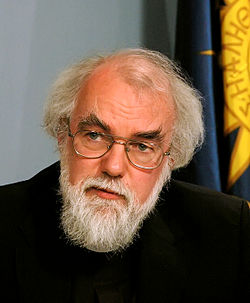Rowan Williams Quote
To share Eucharistic communion with someone unbaptized, or committed to another story or system, is odd—not because the sacrament is 'profaned', or because grace cannot be given to those outside the household, but because the symbolic integrity of the Eucharist depends upon its being celebrated by those who both commit themselves to the paradigm of Jesus' death and resurrection and acknowledge that their violence is violence offered to Jesus. All their betrayals are to be understood as betrayals of him; and through that understanding comes forgiveness and hope. Those who do not so understand themselves and their sin or their loss will not make the same identification of their victims with Jesus, nor will they necessarily understand their hope for their vocation in relation to him and his community. Their participation is thus anomalous: it is hard to see the meaning of what is being done.
To share Eucharistic communion with someone unbaptized, or committed to another story or system, is odd—not because the sacrament is 'profaned', or because grace cannot be given to those outside the household, but because the symbolic integrity of the Eucharist depends upon its being celebrated by those who both commit themselves to the paradigm of Jesus' death and resurrection and acknowledge that their violence is violence offered to Jesus. All their betrayals are to be understood as betrayals of him; and through that understanding comes forgiveness and hope. Those who do not so understand themselves and their sin or their loss will not make the same identification of their victims with Jesus, nor will they necessarily understand their hope for their vocation in relation to him and his community. Their participation is thus anomalous: it is hard to see the meaning of what is being done.
Related Quotes
No books is more fascinating than the Bible. And no books are less fascinating than most of our commentaries on the Bible. Nothing is more formidable and unconquerable than the Church Militant. But no...
About Rowan Williams
Williams's primacy was marked by speculation that the Anglican Communion (in which the Archbishop of Canterbury is the leading figure) was on the verge of fragmentation over disagreements on contemporary issues such as homosexuality and the ordination of women. Williams worked to keep all sides in dialogue. Notable events during his time as Archbishop of Canterbury include the rejection by a majority of dioceses of his proposed Anglican Covenant and, in the final general synod of his tenure, his unsuccessful attempt to secure a sufficient majority for a measure to allow the appointment of women as bishops in the Church of England.
Having spent much of his earlier career as an academic at the universities of Cambridge and Oxford successively, Williams speaks three languages and reads at least nine. After standing down as archbishop, Williams took up the position of chancellor of the University of South Wales in 2014 and served as master of Magdalene College, Cambridge between 2013 and 2020. He also delivered the Gifford Lectures at the University of Edinburgh in 2013.
Williams retired as Archbishop of Canterbury on 31 December 2012, succeeded by Justin Welby. On 26 December 2012, 10 Downing Street announced Williams's elevation to the peerage as a life peer, so that he could continue to speak in the House of Lords. Following the creation of his title on 8 January and its gazetting on 11 January 2013, he was introduced to the temporal benches of the House of Lords as Baron Williams of Oystermouth on 15 January 2013, sitting as a crossbencher. Oystermouth is a district of Swansea. He retired from the House on 31 August 2020 and from Magdalene College that Autumn, returning to Abergavenny, in his former diocese (Monmouthshire).
